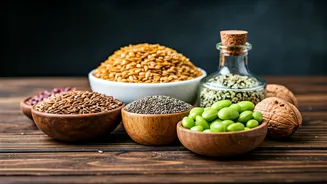Chia Seeds' Power
Chia seeds, tiny but mighty, lead the charge as a fantastic source of Omega-3s. Just a small serving provides a significant dose of these essential fatty
acids, promoting cardiovascular health. Beyond their Omega-3 content, chia seeds are also packed with fiber, antioxidants, and minerals. They're incredibly versatile, effortlessly blending into smoothies, sprinkled on yogurt, or added to baked goods, making it easy to incorporate them into your routine. Remember to consume chia seeds in moderation and increase water intake, as their high fiber content may lead to bloating if not accompanied by proper hydration. Their mild, nutty flavor complements a variety of dishes, enhancing both taste and nutritional value. Embrace the versatility of chia seeds by experimenting with different recipes and discovering new ways to enjoy their benefits.
Flaxseeds' Goodness
Flaxseeds, another powerhouse of Omega-3s, are a beneficial addition to any vegetarian diet. They are a rich source of alpha-linolenic acid (ALA), a type of Omega-3 fatty acid. Ground flaxseeds are easier for the body to digest and absorb the nutrients. Beyond Omega-3s, flaxseeds offer fiber and lignans, contributing to overall health. Adding ground flaxseeds to your diet is simple; sprinkle them on cereal, blend them into smoothies, or incorporate them into your baking. Due to their high fiber content, it's essential to drink plenty of water when consuming flaxseeds to avoid digestive discomfort. The nutty flavor of flaxseeds subtly enhances various dishes. Experiment with incorporating flaxseeds into your meals for a boost of nutrients and a potential enhancement to your health regime.
Walnuts for the Win
Walnuts stand out as a delicious source of Omega-3 fatty acids, offering a delightful crunch and a wealth of health benefits. These nuts are a good source of ALA, contributing to heart health and providing essential nutrients. Enjoy walnuts as a snack, add them to salads, or incorporate them into your cooking to enhance the flavor and nutritional value of your meals. Walnuts also contain antioxidants and healthy fats, supporting overall well-being. Consider the caloric density when consuming walnuts, and practice portion control to maintain a balanced diet. Whether eaten on their own or used as a versatile ingredient, walnuts offer a satisfying way to boost your Omega-3 intake and savor a nutrient-rich treat.
Hemp Seeds' Advantages
Hemp seeds provide a source of Omega-3 fatty acids, making them a nutritious choice. These seeds deliver ALA, promoting heart health and overall wellness. Hemp seeds offer a complete protein source, as they contain all nine essential amino acids. Sprinkle hemp seeds on salads, add them to smoothies, or use them as a topping for yogurt and oatmeal to enjoy their benefits. Hemp seeds offer a slightly nutty flavor and a satisfying texture, enhancing the taste of various dishes. Due to their high nutritional value and versatility, incorporating hemp seeds into your diet is a simple and effective way to increase your intake of Omega-3s and other essential nutrients. Embrace this versatile ingredient to boost your health and savor a satisfying, nutrient-rich food.
Edamame's Benefits
Edamame, or young soybeans, is a good source of Omega-3 fatty acids. This snack is both tasty and provides ALA. Edamame also contains protein and fiber, making it a nutritious and fulfilling option. Steam or boil edamame and enjoy it as a snack, or add it to salads and stir-fries for added flavor and nutrients. This versatile ingredient provides a plant-based protein source, ideal for vegetarians. When incorporating edamame into your diet, remember that moderation is crucial, as is with any food. Explore different recipes and serving options to enjoy this nutritious and delicious food. Edamame provides a tasty method to incorporate Omega-3 fatty acids and other important nutrients into your meals, helping you maintain a healthy diet.
Seaweed's Treasure
Seaweed can be a source of Omega-3 fatty acids, making it a valuable addition to a vegetarian diet. Seaweed contains ALA and often offers other essential nutrients. Nori, kelp, and wakame are some popular seaweed varieties. Add seaweed to soups, salads, and snacks to enjoy its unique flavor and health benefits. Seaweed is a nutrient-dense food, providing essential minerals and antioxidants. Be mindful of the sodium content in some seaweed products. Look for low-sodium options to maintain a balanced diet. Incorporate seaweed into your diet through various recipes to relish a nutritious source of Omega-3 fatty acids and other essential nutrients, aiding in heart health and overall well-being. Seaweed is a versatile ingredient, perfect for enhancing the flavor and nutritional profile of your meals.
Brussels Sprouts' Value
Brussels sprouts, often overlooked, deliver a dose of Omega-3 fatty acids along with many other health benefits. While not as high in Omega-3s as some other foods, they still contribute to your daily intake. Brussels sprouts also offer fiber, vitamins, and antioxidants. Roasting, steaming, or sautéing Brussels sprouts brings out their flavor, transforming them into a delightful side dish. Combine Brussels sprouts with other vegetables and seasonings for a diverse and healthy meal. When incorporating Brussels sprouts into your diet, ensure they are cooked properly to optimize flavor and digestibility. Embrace Brussels sprouts for their versatility and potential to enhance your dietary intake of Omega-3s and other essential nutrients, ultimately supporting your well-being. This vegetable is a fantastic way to add both flavor and nutritional value to your plate.
Spinach's Nutrients
Spinach provides a small quantity of Omega-3 fatty acids, offering a boost to your diet alongside other essential nutrients. This leafy green delivers ALA, as well as vitamins, minerals, and antioxidants. Sauté spinach, add it to salads, or blend it into smoothies to enjoy its versatility and health benefits. Spinach’s mild flavor makes it a versatile ingredient, perfect for a variety of dishes. Consider that cooking spinach can help release its nutrients for easier absorption. Make spinach a regular part of your diet to benefit from its Omega-3s and other vital nutrients, promoting your overall health. Include it in your meals to boost your health and savor a nutrient-rich vegetable. Spinach adds a nutrient-dense option to your daily intake and aids in your efforts towards a balanced and healthy lifestyle.
Kiwifruit's Contribution
Kiwifruit is also known to provide a small amount of Omega-3 fatty acids to help you achieve your daily intake. This delicious fruit is a source of ALA. Kiwifruit is also packed with Vitamin C and other antioxidants, supporting your overall health. Enjoy kiwifruit on its own, add it to smoothies, or use it in fruit salads for a refreshing and nutritious treat. Kiwifruit's vibrant flavor and texture make it a versatile ingredient. Integrate kiwifruit into your diet to benefit from its Omega-3s, essential vitamins, and other vital nutrients. Relish the delicious flavor and boost your health with this versatile and nutrient-rich fruit. It is also an excellent choice for a snack or dessert. Incorporate it into your meals to improve your health and enjoy a naturally sweet and refreshing treat.
Plant-Based Oils
Certain plant-based oils offer a concentrated source of Omega-3 fatty acids. Flaxseed oil and hemp seed oil, particularly, are great options. These oils contain ALA, offering a potent dose of Omega-3s. Use flaxseed oil and hemp seed oil in salad dressings, or drizzle them over cooked dishes to enhance both flavor and nutritional value. Remember that these oils should not be used for high-heat cooking. Always adhere to moderation when using oils, and consider them as a part of a balanced diet. Plant-based oils offer a convenient and effective way to increase your Omega-3 intake, potentially supporting your heart health and overall well-being. Integrating plant-based oils into your diet allows you to gain the advantages of Omega-3s, helping you to lead a healthy lifestyle.





















